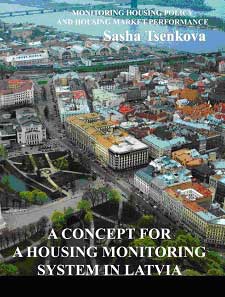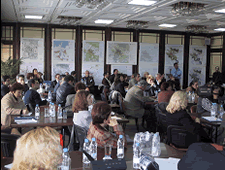
Tsenkova, S. (2004) Lithuanian Housing Strategy: Monitoring and Implementation. Vilnius: Ministry of Environment of Republic of Lithuania, 112 pages.
The research develops a system of indicators to monitor housing policy and market performance in Lithuania. The approach is designed to assist the implementation of Lithuania’s Housing Strategy as well as to facilitate comparisons with the countries in the European Union.
The publication was prepared in the framework of the Lithuanian-Canadian Housing Cooperation Project sponsored by the Canadian International Development Agency.

Tsenkova, S. (2004) Urban Sustainability
Progress and Challenges in Europe and North America
Geneva: United Nations Economic Commission for Europe, 78 pages; Translated in French and Russian.
The report evaluates progress and challenges in the implementation of sustainable development objectives in 55 countries. It explores issues related to urban management, sustainable land use planning and the provision of affordable urban services.
Financial support by the United Nations, Division of Sustainable Development, New York

Nedovic-Budic, Z. and S. Tsenkova (eds.) (2004) Winds of Societal Change: Remaking Post-communist Cities..
The papers included in the book were presented at the international forum Remaking Post-communist Cities organized under the auspices of the Russian, East European, and Eurasian Center at the University of Illinois in June 2004.
The contributions can be accessed on line at:

Results:
- Project Approval Document developed and approved for follow up appraisal and lending.
- Development of a monitoring system for evaluation of results.
Assisted in the assessment of housing reforms and analyzed forms of Bank assistance in the areas of housing policy development and institutional capacity building for housing; discussed with government and private sector officials alternatives to assist the development of a national housing policy framework and identified key issues that need to be addressed in the housing policy agenda.

Latvian-Canadian Housing Cooperation: Institutional Development and Capacity Building, 2002
The overall goal of the Project is to facilitate the institutional development of major housing policy organizations in Latvia. It aims at increasing pluralism, decentralisation of decision-making and more effective governance in the housing sector.
Results include:- An inventory of existing indicators/databases on housing markets and policy developed.
- Consensus established on key housing market and policy indicators that need to be monitored to allow the development of efficient and effective national housing policy.
- A concept of a housing monitoring system developed in partnership with Ministry of Environmental Protection and Regional Development .
- Scaling-up of Riga's learning experiences and country-wide dissemination of training materials.
- The institutional capacity of major housing agencies is enhanced through the availability of a housing monitoring and evaluation system that ensures better market responses, policy coordination and coherent and transparent policy intervention.
Client: Canadian International Development Agency/ The Government of Latvia


Latvian-Canadian Housing Cooperation Project, 2000-2001
Project Goal: Improving the efficiency and effectiveness of the City of Riga and its ability to respond to the housing needs of local residents in a systematic manner.
The project is guided by the following objectives: (i) to assist the development of a Housing Policy for the City of Riga with an emphasis on partnerships among the municipal government, private organizations and local communities; (ii) to strengthen the institutional capacity of municipal housing institutions through training in housing management.
The Latvian-Canadian Housing Cooperation Project was particularly successful and outperformed expectations in the area of policy development and capacity building. Most significant results include:
- Developing a Housing Policy for the City of Riga with a focus on plans of action for priority sectors and mechanisms to facilitate public/private partnerships.
- Developing a system of housing indicators to monitor progress & policy intervention.
- Dissemination of key findings on Riga's housing market performance and housing policy through a publication endorsed by Riga City Council and interactive web page.
- Building local capacity to initiate housing programs, to manage and maintain housing through intensive training of 15 leading housing professionals in Canada and on-site training (seminar & specialized workshop) for more than 70 experts.
- Developing a 200-page information guide for homeowners of multifamily housing.
- Developing a two-week training module for cooperative societies of homeowners (CSH) .
- Creating local partnerships to develop a training manual and to deliver 3 pilot training courses for 47 homeowners in Riga.
Client: Canadian International Development Agency/ The City of Riga


Sofia City Development Strategy, 2000-2002
Project Goals and Objectives: The goal of this initiative is to enhance the development of democratic and self-reliant municipal management system in Sofia in a manner that generates sustainable, long-term benefits for its residents.
Sofia's Development Strategy (CDS) is guided by the following objectives: (i) to establish the basis for sustainable economic growth, (ii) to identify alternatives for more equitable social development and reduction of poverty; and (iii) to ensure participatory local governance and decision-making.
Project Results:
The CDS converts analytical work into a strategic planning process. While it aims at establishing a stakeholder
vision for the future development of the city and action plans for priority areas, it also focuses on capacity
building efforts so that Sofia municipality can sustain the work of monitoring, planning, and consultation
needed to augment the CDS. The results include:
- Analytical assessment: In-depth evaluation of trends in the local economy, and the obstacles -- institutional, financial, environmental and social -- which may constrain future development. Sofia's spatial analysis emphasized the importance of urban form, regulatory constrains to private economic activity, infrastructure provision and housing. The results were presented to the Mayor and senior municipal officials and disseminated widely through the municipal web page.
- Assessment of Sofia's business environment and potential for growth through interviews with established business leaders, foreign investors, banks, representatives of business associations, trade unions and NGOs .
- Building consensus on CDS priorities: Several workshops/round tables were organized in July 2001 to set CDS priorities, to map out Sofia's vision and to define a strategic plan of action in priority areas. The process brought more than 200 experts together. Another round of public consultation with major stakeholders to refine the action plans was carried out in April 2002.
- Development of Sofia CDS with a well-defined plan of action and investment priorities; endorsement of the strategy by the Mayor.
Client: World Bank; Cities Alliance/Municipality of Sofia



Environmental Performance Review of Macedonia, 2002
Joined the UNECE team to provide an evaluation of the legal, institutional and policy framework related to spatial planning; developed recommendations for policy reforms to enhance the performance of national institutions in that area.
United Nations Economic Commission for Europe (UNECE) (2002) Spatial Planning. In Silveira, M. et al. (eds.) Environmental Performance Review of Macedonia, Geneva: United Nations Economic Commission for Europe, pp. 1-18.
Environmental Performance Reviews: The former Yugoslav Republic of Macedonia
Client: United Nations Economic Commission for Europe/The Government of Macedonia
Monitoring and Evaluation of Urban Projects, 1999
Provided strategic recommendations for CIDA's urban partnership projects in Central and Eastern Europe. Carried out assessment of technical assistance projects in the Baltic States, the Czech Republic, and Hungary (in partnership with Shelter Consultants). Provided post-implementation assessment of strategic planning in the cities of Tallinn, Vilnius and Riga.
Client: Canadian International Development Agency

